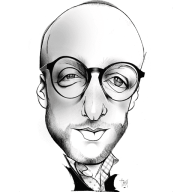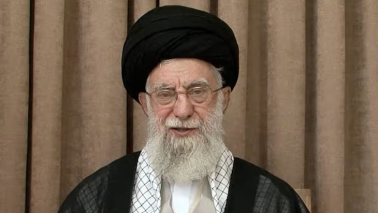In the imagination of the world, there could be nobody more Jewish than the ultra-Orthodox. With their black hats, sidecurls and frock coats, they are taken as the very epitome of the culture. That is why their radical fringes are appropriated by Israelophobes seeking a cover for their bigotry, as if suffering a cartoonish Jewish ally is a price worth paying to evade charges of antisemitism.
Tens of thousands of young men devote their lives to taxpayer-funded study while their secular compatriots place their lives on the line
This week, pictures of such apparently devout Jews clashing with Israeli police were seized upon as another opportunity to delegitimise the state of Israel. Look, the bigots said with some glee, the real Jews are being attacked by the dastardly Zionists. Without much knowledge of that closed community, its location within the Israeli cultural landscape and the reason for the outbreak of violence, non-bigots could only watch in bewilderment. With its Pride celebrations, Eurovision songs and Miami-style beaches, Israel can often feel very accessible. But this could not be more of a mystery. What was going on?
I grew up in a mild corona of the ultra-Orthodox community, known simply as ‘Orthodox’. Somewhere, my mother has a photograph of me on my barmitzvah smiling sheepishly beneath the brim of a black trilby. I left that world when I was 17 and after a few years of meandering, found a way of expressing Jewishness that feels to me more authentic.
The early Zionists rejected the ultra-Orthodox way of life. The Israelites in the Bible were a proud people, masters of their own kingdom with both swords and books never far from their side. They were Spartans and Athenians rolled into one, a Bronze Age tribe that inspired millennia of culture on which western civilisation is based.
After the Jews were exiled from their homeland 2,000 years ago, however, their culture degenerated into a feeble bookishness that lived or died on the whim of kings and emperors and was unable to muster any kind of self-defence when the mob came to their doors. By the 19th century, the new Zionist movement proposed a return to the Israelite culture of the Bible. Tales of pogroms in which religious men had their throats slit while clinging to Torah scrolls in the synagogue while their wives were raped and strung up at home became emblematic of the way in which Jews had lost their way. The shtetl-dwellers were disparaged as a degeneration of Jewishness, not its ultimate expression. Sparta had been forgotten. It was time to put the books to one side and fight back.
Fast-forward to today, and the two poles of Jewish culture exist in an uneasy status quo in Israel itself. There is a wide range of theology and tradition within the ultra-Orthodox world, but a dominant trend is opposed to the existence of the modern state, resting its hopes instead on a Jewish kingdom that is prophesised to follow the coming of the Messiah. In the meantime, they wish to exist as a sealed society following two driving principles. First, they wish to rebuild a community and way of life that was almost entirely destroyed during the Holocaust. (The great ultra-Orthodox seminaries in Israel, such as Mir and Ponevitch, still take the names of their predecessors in Belarus and Lithuania.) The growing ultra-Orthodox segment of Israeli society is an island of eastern European way of life in a population that is increasingly Middle Eastern. The costume alone is obviously ill-suited to the climate.
Second, the ultra-Orthodox wish to study the Torah. This is the second idea that is key to understanding the unrest on the streets of Jerusalem this week. It is impossible to underestimate the importance of Torah study in that world. For men, it is the very meaning of life. Eschewing financial security, worldly status and modernity, they dedicate themselves for more than 15 hours a day to study in seminaries known as yeshivot, leaving their wives to bring in whatever money they can (increasingly with jobs in Israel’s burgeoning high-tech industry). Men also take on much of the burden of childcare. Given that they commonly can have more than ten children – repopulation after the Holocaust – this can be a considerable task, though the older siblings play important roles too.
After the devastation of the Hitler years, the state of Israel felt a responsibility towards supporting the twin aims of the ultra-Orthodox. At the time, the community numbered no more than a few thousand. Given the central significance of Torah study in their world, Israel’s first leader, David Ben-Gurion, allowed their brightest minds to live a life of seclusion without being called upon to serve in the army.
Initially, the numbers were small, with no more than about 500 requiring exemption. Today, however, after decades of exponential demographic expansion, the ultra-Orthodox account for about 13 per cent of Israeli society, with tens of thousands of young men devoting their lives to taxpayer-funded study while their secular compatriots place their lives on the line. As defence minister Yoav Gallant pointed out last week, 671 soldiers have been killed since the beginning of the war in Gaza, with 4,000 wounded. The lopsided burden is becoming unbearable.
The real flashpoints, if they come, can be expected in the coming draft years
It is also becoming unsustainable. Unlike all other poor communities around the world, the ultra-Orthodox do not suffer from high levels of crime, family breakdown and addiction. But they act as a heavy drain on the state at a time when it is under unprecedented strain. With war looming in the north of the country, Gallant told the Knesset’s foreign affairs and defence committee that the Israel Defense Forces (IDF) was 10,000 soldiers short. That is why the High Court ruling last week that lifted the ultra-Orthodox conscription exemption was so vital.
That was the catalyst for all this. Finally, the archetypical Diaspora Jew is going to have to start assimilating into Zionist society. According to the Attorney General, between 63,000 and 77,000 young ultra-Orthodox men were now eligible for the draft, but this would need to come gradually. Not only would a mass conscription likely spark civil unrest, but the IDF lacks the infrastructure required for accommodating platoons of soldiers who require specific kosher food, cannot be exposed to women and must stick to a rigid prayer schedule.
But it has been legally mandated and must happen. Three thousand are scheduled for enlistment in the current draft year – which began in June – on top of the roughly 1,800 more outward-looking members of the community who enlist each year anyway. This is a watershed moment for the ultra-Orthodox. In recent decades, increasing numbers have started to look favourably upon the prospect of greater integration with Israeli society. More conservative factions, however, view this with horror, fearing the dilution and dissipation of the very way of life that the community is designed to protect.
This is a watershed moment for the ultra-Orthodox
The community’s leadership, which currently holds a kingmaker position in Israel’s ruling coalition – another advertisement for the foolishness of proportional representation – has long flexed its muscles to preserve the status quo and increase its political bargaining power. Moreover, it is able to exert its influence downwards through the community. The marriage system in ultra-Orthodox life rests upon a network of matchmakers, who link families based upon their perceived religious and cultural status. This can be a powerful deterrent against stepping out of line.
Although the broadening of conscription has triggered some protests, these have so far not been unmanageable. The process will be gradual, probably focusing on those young men who are less saturated in ultra-Orthodox culture, or those who are not temperamentally suited to a life of study anyway. Secular activists are watching developments like hawks, ready to hold the government to account if it deviates even slightly from the ruling. The real flashpoints, if they come, can be expected in the coming draft years, when the army moves its recruitment drive further into the heart of the community.
When viewed from outside the country, this episode cuts to the heart of the animating spirit of Israel. Its identity is bound up with Jewish survival, not just physically but spiritually. Its momentum is that of two thousand years of exile, characterised by the most depraved and persistent persecution ever suffered by any minority anywhere, combined with the repeated attempt to become accepted equal citizens of other lands, continually and bloodily rebuffed. It is a project of resolving the ancient and the modern, the Godly and the temporal, the tribal and the democratic, the East and the West, all under existential pressure from enemies on every border and beyond that – as we saw on October 7 – would savage all Jews in a heartbeat.
This is the boiling pot of the Jewish state. It’s hardly surprising that there are a few protests.








Comments